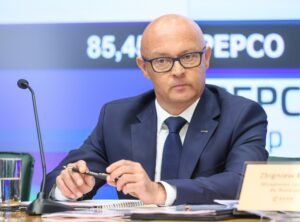We talked to Artur Runge-Metzger, head of climate strategy at the European Commission about Poland’s potential in production of batteries for electric vehicles.
BiznesAlert.pl: What are the challenges for battery industry in Poland and Europe?
Artur Runge-Metzger: The biggest challenge is that Europe does not have access to its own cell production. If we want to build batteries for cars and build millions of cars in Europe, we will also have to bring the cell production to Europe. We can see that there is currently much investment made in the car manufacturing industry, to put these cells together to have the best batteries for the cars.
Another big challenge is the next generation of cells that will come up in the future, that will hopefully be cheaper and better, and Europe must have its stake in it. We will have to spend a lot more money on research in the upcoming decade.
Two years ago, Battery Alliance, a project supporting the battery industry in Europe kicked off. Poland, Germany, France and Sweden took part in it. What do you think about this initiative?
Back then, the vice-president of the European Commission Maros Sefcovic brought together different industries, because battery production requires cooperation of a number of sectors – chemistry, electricity, car manufacturing, research institutes. Battery Alliance is working, these industries meet regularly in order to define where exactly the research needs to be done, where the investments should be made and to communicate the policy makers, so that they can shape their policies to optimally support the private sector.
What is the financial support for the battery industry in the European Union?
EU supports research technology development, in the coming 2-3 years, 300 milion euros will be made available for further research in batteries, and another package of support has to do with investing in factories, and that is very much in the hand of the member states, who have access to regional funds, using which they can build the factories. A goal of the Juncker Fund is to make these investments cheaper. An example for that is that the European Investment Bank signed a deal of 50 million euros with a Swedish company that wants to build a cell element factory in Sweden in the coming year.
What is Poland’s position in the production chain in battery production?
At the level of a government policy, there is a strong support towards electrification, and the ministry of economy wants to capture new production lines to Poland, first investments are being done here. We can see progress in the electric buses business, they are spearheading in Europe. We hope that they will all be successful, we heard that Volkswagen’s e-Crafter will come out this year, that is also very good for the Polish economy.
Interview conducted by Bartłomiej Sawicki








